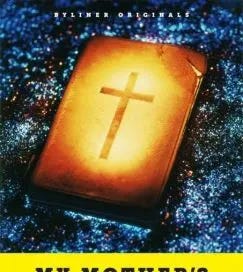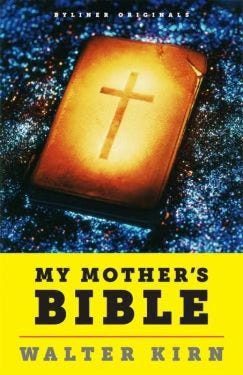Stories of Belief: "My Mother's Bible" by Walter Kirn
This week, we read Walter Kirn's essay about meeting his mother through the story of the Fall
This is the second entry in my series “Stories of Belief.” You can read more about the series here.
Walter Kirn’s essay is an excerpt from his book, My Mother’s Bible. This portion, in particular, is a reading of the story of the Fall in Genesis 3. If it’s been a while since you’ve read it, you can do so here, and note that link goes to the King James Version, which is how Kirn is reading it and, incidentally, how I read the Bible as a kid as well.
Walter Kirn was born in 1962. He grew up in Minnesota and his family was, for a time, Mormon, but not anymore. He’s written a bunch of novels and works of nonfiction; a couple of his novels have been made into movies, including “Thumbsucker” with Keanu Reeves and Vince Vaughn and “Up in the Air,” with George Clooney and Anna Kendrick. In 2013, he released a short book titled My Mother’s Bible, but as far as I can tell it is no longer available. Fortunately, Slate published an excerpt (which is what I’m discussing), which you can read here.
The book is occasioned by the death of Kirn’s mother. He writes, “Two Augusts ago, my mother, Millie Kirn, a 71-year-old retired nurse, died suddenly of brain infection. While going through her things a few days later, I found a book I hadn’t known she’d owned: an oversize King James Study Bible whose pages were covered with handwritten notes.” He took up this project, he writes, “in my grief, as a way of feeling close to her.”
Interestingly, in light of our discussion of the “scrim” last week in Mary Karr’s “God Shopping,” Kirn calls this “a conversation through the veil.” At the end of the same paragraph he says, remorsefully, “people can be so neglectful of each other and of their own heritage—then death intrudes. Conversations we wish that we’d had earlier are had too late. This is part of one of those.”
In revisiting the stories in his mother’s Bible, Kirn notes that the stories are stranger than he ever expected. If you’ve had the opportunity to revisit stories you thought you knew from childhood – Bible stories or otherwise – you know this experience. I had so much fun teaching “Jesus Class” at Regis because I got to introduce stories from the Gospels to students for the first time and, to be frank, some of those stories are strange. Casting demons into pigs, anyone? And that’s the New Testament, which is tame in comparison to what we find in the Old Testament.
This story Kirn takes up here, the story of the Fall, is no exception.
The essay begins with one of my favorite opening lines ever: “At last I think I understand: The story of the Fall is about a drug bust and its aftermath.” The writer or writers of the story had a goal, he theorizes, which was, “consolidating their hold on law-giving and other ‘holy’ prerogatives.”
Is this a cynical view of the story? Yes.
An accurate one? We’ll see.
Do you ever think about why these stories exist? What are we supposed to take away, for example, from the story that precedes this one, about the world being created in 7 days?
Kirn writes that the famous forbidden fruit “sensitizes the mind to the presence of ‘good’ and ‘evil,’ essentially making priests of those who take it,” and therefore making other – official – priests redundant, which seems to affirm the cynical view he takes of its writers.
And then, seemingly apropos of nothing (but not really) we get a story about a time Kirn dropped LSD “about an hour before a Thanksgiving dinner.” As he looked around the table, he writes, he saw “thoughts, like wisps of fog, moving in and out of people’s heads.” Some thoughts were beautiful and some were ugly, “which caused people’s faces to change accordingly.”
And then we’re back to Bible: the humans eat the fruit, or “take the stuff,” as he writes, because like god, they’re restless creatures. And, because they’re restless creatures, he doesn’t fault them their choice.
In fact, he writes, if they hadn’t eaten the fruit, “life would have been like one of those mass Christmas cards that some of my relatives sent out every year” in which everything is great and nothing has changed. In short, life would be super boring.
But what about the serpent? He describes Satan as, “the creature who turns the humans on.” To Kirn, he is a remarkable creature. He, like the tree from which the fruit grows, is close to nature, attached to earth, “as far from hierarchies and sky gods as it is possible to get.”
Thus, the snake, in Kirn’s telling, introduces texture to experience, makes life interesting.
So, of course, Adam and Eve eat the fruit, God finds out and they’re in trouble. They’re banished and they feel shame, which Kirn notes, is “self administered.”
What they don’t do when they eat the fruit, Kirn writes, “is realize they've been set up” and blame God. God trapped them, Kirn says. “He could have made disobedience impossible rather than virtually inevitable.”
His mother has something to say about his as well. On the page she wrote, “God gives the order re: ‘the apple’ before Eve is created.” Her idea is that the order wasn’t given to Eve; it was given to Adam! And, further, if God had given the order to Eve or, as Kirn writes, “deigned to speak to Eve directly, showing her a little more respect,” none of this mess would have happened.
So what he takes away from all of this is that the original sin on which all other sins follow is “closer to taking mushrooms than taking a life,” and this causes him the question “was the appetite there all along?”
What is the appetite he’s referring to? It is the desire to move beyond, to know more. To gain the knowledge that the tree promised.
In the last paragraph, he returns to his mother and her time working as a nurse in a rehab clinic. He says that one of his mother’s patients was the writer Truman Capote, himself a complicated person and writer who destroyed himself with pills and booze.
That same appetite was in Capote, and I think Kirn is turning an eye on himself, and identifying that appetite in a lot of writers. Kirn’s mother once asked Capote if he had any advice for her son about becoming a writer. “Not at all,” Capote said. “Tell him you either are one or you aren’t.”
And this brings Kirn to his final move where he aligns Eve with this tradition: “I think Eve was a writer. And Adam wished he were.”
What do we make of this? What does it mean that Eve was a writer? Why did Adam wish he was?
Maybe, Eve had the appetite, was drawn to the “substance” in an effort to fill that need to see beyond…to gain knowledge. And perhaps Adam was just following along? To put it another way, Eve was, like God, a restless creature in need of the knowledge that adds texture to life, makes life more than Christmas card updates.
There’s an interesting meta-story here. Again, Kirn’s mom has just died unexpectedly and he’s finding out that she had this secret life with the Bible. There is a sense in which, maybe, he’s jealous of the Bible, or of God, as strange as that sounds.
Let me explain. He says there’s this appetite, right, for knowledge. And he thinks that writers are particularly tuned to it. It feels like this conversation that he’s having with his mother after her death is an effort to keep searching for that knowledge.
BIG QUESTIONS: Let's end by thinking about that appetite. Do we have an appetite to know more, to grow beyond? Or is it more simple: is it an appetite to rebel? Another way to ask this, are humans inherently good, but we mess up? Or bad, with the potential for good? How does the story of Adam and Eve come down on that in Kirn’s reading? In yours?
Next week we read “Salvation” by Langston Hughes. You can find the text of the story here.





